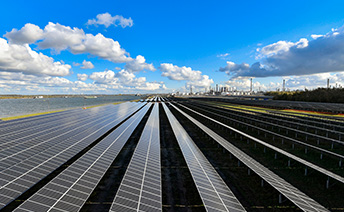Industry association review methodology
We selected the 39 industry associations for review because:
- we consider them to be influential in climate and energy transition-related public policy;
- they operate in regions or countries where we have significant business activities; and
- either their climate and energy transition-related policy and advocacy positions have attracted the attention of Shell, investors or non-governmental organisations, or Shell could be considered influential in these associations.
The assessment process comprised the following steps:
- Third-party consultants undertook data gathering and analysis of publicly available policy and advocacy evidence relating to the industry associations. This included reviewing their websites, government consultation submissions and social media posts.
- We sent an optional questionnaire to industry associations to seek more information regarding their policy and advocacy. We reviewed this information to determine whether to include it in the review.
- We reviewed the publicly available evidence against our assessment criteria to determine the assessment outcomes.
Following publication of this report, our Chief Executive Officer will write to the 39 associations to provide a copy of this report and, for associations where misalignment has been identified, to set out our expectations and next steps.
Assessment criteria
We assessed the associations’ publicly stated policies, and their advocacy positions mainly for the period January to December 2022, against the criteria provided in Table 3. These criteria are based on Shell’s global climate and energy transition policy positions; we selected the positions that we considered most relevant to reviewing the associations and adapted some criteria to make them more appropriate for use in the assessments.
We examined whether meaningful policy and advocacy position differences existed on policy issues which we consider to be relevant to the association. We also considered whether the policy and advocacy positions taken by the associations appear intended to help advance the energy transition or to impede the technologies or markets that will be needed.
If an association publicly stated a position that was contrary to one of Shell’s climate-related policy or advocacy positions, we considered this to be misalignment.
If an association did not publicly state positions in support of the goal of the Paris Agreement and/or net-zero emissions by 2050, we considered this to be misalignment. If an association stated support for the goal of the Paris Agreement and/or net-zero emissions by 2050, but this was not evident in the positions it took on headline national policy frameworks, we also considered this to be misalignment.
We considered which of our policy positions were relevant to each association. If an association did not state a position, and we considered the issue not relevant to the association, we did not assess misalignment for this issue. However, if an association did not state a position, and we considered the issue relevant to the association, we considered finding misalignment on this issue. We weighed up whether an association not stating a position on the issue could undermine our support for the goal of the Paris Agreement and for policies to help society achieve net-zero emissions by 2050.
An example of this is our assessment of associations that focus on upstream oil and gas issues. If such an association did not take a position on road transport decarbonisation, we would not find misalignment since this is not an issue we would expect an upstream association to take positions on. However, if an upstream association did not take a position in support of the direct regulation of methane emissions, and the ending of routine flaring by 2030 or sooner, we would find misalignment because we would expect an upstream association to take positions on these important issues.
Assessment criteria (Table 3)
Paris Agreement and net-zero emissions
- Support for the temperature goal of the Paris Agreement.[1]
- Support for net-zero emissions by 2050.
Carbon pricing
- Support putting a direct price on carbon emissions as part of a broader policy framework to achieve net-zero emissions.
Energy efficiency
- Support improving energy efficiency through standards and regulatory instruments covering key sectors of the economy.
Decarbonised hydrogen
- Support policies that accelerate the deployment of decarbonised hydrogen (including hydrogen produced through electrolysis and natural gas with carbon capture and storage (CCS)), and hydrogen-based fuels, based on life-cycle analysis greenhouse gas intensity measures.
Natural ecosystems
- Support policies that encourage public and private investment to protect and expand natural ecosystems that store carbon.
- Support policies to ensure that nature-based solutions complement and do not displace efforts to avoid and reduce greenhouse gas emissions.
Carbon capture and storage (CCS)
- Support policy mechanisms to drive deployment of CCS at scale.
Environmental, social and governance (ESG) standards and benchmarks, sustainable finance taxonomies
- Support common standards and benchmarks to allow comparison of ESG reporting.
- Support the development of sustainable finance taxonomies that balance transitional and low-carbon projects to advance the energy transition.
Coal
- Support ending approval of investments in new unabated coal power generation.
- Support phase-out of unabated coal power generation by 2040, where feasible.
Electrification with renewable or low-carbon power
- Support accelerating electrification using renewable and low-carbon power sources.
Gases and methane
- Support policies that recognise natural gas and other low-carbon gases as partners for renewable sources.[2]
- Support reducing methane emissions throughout the natural gas supply chain through direct regulations such as performance standards based on robust monitoring, reporting and verification frameworks.
- Support ending routine flaring by 2030 or sooner.[3]
Road transport: Passenger cars and vans
- Support policies to facilitate the decarbonisation of light-duty road transport, including not opposing pathways to zero-emission vehicles.[4]
Road transport: Heavy-duty vehicles
- Support establishment of regional decarbonisation policy frameworks for heavy-duty vehicles, including fuels policy to encourage use of advanced biofuels and biogas.
Heavy industry decarbonisation
- Support policies to facilitate the decarbonisation of heavy industry, including those that create demand and encourage supply of low-carbon energy in industry.[5]
Aviation
- Support policies to facilitate the decarbonisation of aviation.
- Encourage the International Civil Aviation Organization to adopt a net-zero emissions target for 2050.
- Support introduction of mandates or incentives for sustainable aviation fuel (SAF).
Shipping
- Support policies to facilitate the decarbonisation of shipping.
- Encourage the International Maritime Organization to adopt a clear path to net-zero emissions by 2050.
- Set carbon-intensity target for fuels across the full life cycle, from the production of the fuels to their use by ships, and implement a market-based mechanism such as a carbon price.
[1] Temperature goal of the Paris Agreement: to limit the increase in the global average temperature to well below 2°C above pre-industrial levels and to pursue efforts to limit the temperature increase to 1.5°C above pre-industrial levels.
[2] Low-carbon gases refers to biogas, biomethane, hydrogen made from renewable sources, hydrogen sourced from natural gas, and synthetic methane.
[3] Shell supports ending routine flaring by 2025. However, we recognise that the World Bank’s Zero Routine Flaring Initiative commits governments and oil companies to end routine flaring no later than 2030.
[4]
Shell’s global climate and energy transition policy positions state: “Support setting clear timelines for the widespread adoption of zero-emission vehicles and the phase-out of sales of new internal combustion engine vehicles. Although markets will vary in pace, the promotion of investment in infrastructure for electric vehicles, incentives to purchase low- and zero-carbon vehicles, the generation of adequate amounts of green power, and incentives to produce alternative and low- and zero-carbon fuels are needed to achieve these outcomes. Shell believes that in the majority of developed countries, this transition should happen in the 2030s.”
However, we recognise there are differing views on the pathway to decarbonise light-duty transport, and some associations support a technology-neutral policy approach. The assessment criteria therefore focus on the overarching objective to decarbonise light-duty transport, rather than the pathway to achieve it. In cases where Shell has publicly stated support for the phase-out of sale of internal combustion engine light-duty vehicles by 2030 or 2035, but where associations have stated their preference for a technology-neutral approach, we have noted this difference in positions for transparency.
[5] Industries such as cement, steel, aluminium production.










